
Originally published in The Clarinet 51/2 (March 2024).
Copies of The Clarinet are available for ICA members.
International Spotlight
Interview: Salvatore Schembari, First Clarinet of the Italian Army Band
by Luca Saracca
English Version
Access to a military garrison has its own rules. Once I have delivered the documents and collected the entry pass for the Città Militare Cecchignola (Cecchignola Military Compound) in Rome, I am welcomed, in the headquarters of the Military Band of the Italian Army, by the first clarinet and First Marshal Lieutenant Salvatore Schembari, who shows me directly into the rehearsal and concert room.
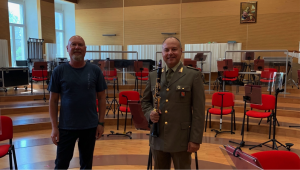
Luca Saracca and Salvatore Schembari
Luca Saracca: Thank you, Salvatore, for this invitation and for accepting the proposal to carry out this interview. I must observe, to my great surprise, that this rehearsal room has an extremely auditorium-like appearance.
Salvatore Schembari: I thank you, Luca, for this visit, and yes, this rehearsal room of ours also serves as an auditorium and has hosted performances in the form of short concert seasons and educational events for students of all levels. These activities were interrupted due to the restrictions of the recent COVID-19 pandemic, but resumed in 2023 as did all the band’s concert activity and institutional events.
LS: It is a varied and interesting program which we will talk about in depth shortly, but first, you promised me a short visit to the band’s private museum.
SS: Of course, my colleague First Marshal Lieutenant Giovanni De Socio is waiting for us; he is the curator and manager of our museum.
LS: This place contains, despite its small dimensions, a quantity of musical testimonies of great value.
Giovanni De Socio: Absolutely yes; on the walls you can observe the posters that recall many of the most important concerts, and in our archive we keep the scores of compositions dedicated to the band by the masters who directed it, first of all Maestro Lacerenza.
SS: Maestro Major Amleto Lacerenza was the first director of the Italian Army Music Band (founded on June 2, 1964), to which he dedicated numerous transcriptions and compositions. The other directors who followed did the same, such as Maestro Lt. Col. Fulvio Creux, director from 1997 to 2013, who, in 2004, composed 4 May which is still our Ordinance March.
Having thanked Prof. De Socio, we sit in a “musical lounge” surrounded by furniture displaying a beautiful collection of historical wind instruments.
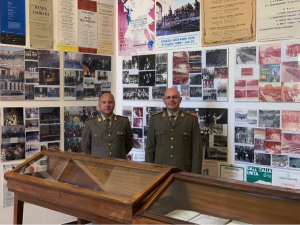
Salvatore Schembari and Giovanni De Socio in the Museum Hall of the Italian Army Band
Sala Museo della Banda dell’Esercito Salvatore Schembari e Giovanni De Socio
LS: Well Salvatore, let’s continue talking about the Italian Army Band today.
SS: The Army Band is made up of 102 orchestra members (the so-called “Vessellian ensemble”), an archivist, a master director who since 2019 is Maj. Filippo Cangiamila, and a master deputy director, Maj. Antonella Bona. The members of the band all have a non-commissioned officer rank and recruitment takes place through a national competition.
LS: As we said before, yours are not just institutional commitments.
SS: Certainly not; in addition to the institutional tasks that a military band belonging to the Armed Forces has the duty to fulfill, the concert vocation has an equally significant importance. This has been seen in history by important concerts in prestigious theaters in Italy and abroad, tours in Europe and the United States of America, and participation in important national and international festivals collaborating with world-famous artists.
LS: How did you decide to become part of this musical formation?
SS: My, let’s say, musical adventure with the Army Band began not long ago. The national competition in which I participated was in 2010. We must note that these particular competitions are divided into two very distinct phases: there is a “military” part made up of tests and medical visits which are related to the unequivocal fact that by becoming a member in the Armed Forces you must be judged capable of fulfilling this role. The second part is the one assessed later and is related to the musical part. After passing the tests and being the winner of this audition, I joined this institution at the age of 39.
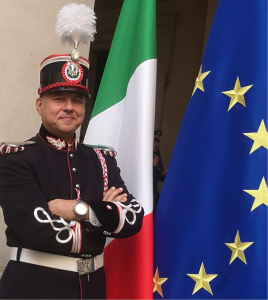
Salvatore Schembari
LS: Well, let’s take a step back and start again from when you decided to study the clarinet.
SS: Yes, you know, like many clarinetists and wind instrumentalists I happened to start studying very young in the music band of my town; equally very young I graduated from the Conservatory of Catania under the guidance of Maestro Vincenzo Maggiore. Subsequently I invested part of my time in courses in instrumentation/composition for wind orchestra and orchestra conducting, and I graduated from the conservatories of Salerno and Frosinone, also following the composition path, all this without ever neglecting the development of instrumental performance by attending courses at the Accademia Chigiana in Siena where I graduated under the guidance of Maestro Giuseppe Garbarino.
LS: I read from your CV that in addition to Maggiore and Garbarino you studied with Fulvio Creux, Luigi Avallone, and Giorgio Proietti, but in parallel with your studies you had an intense professional activity.
SS: Certainly. As I was telling you, I arrived at this position at a fairly advanced age and in the meantime I had the opportunity to collaborate with important orchestras in many theaters: Massimo-Bellini Theater of Catania, San Carlo Theater of Naples, Teatro Regio of Parma, Parco della Musica of Rome, Ukrainian National Orchestra, and Savona Symphony Orchestra. I have also carried out intense concert activity as a soloist and in the chamber repertoire, and I dedicated myself to conducting and composition.
LS: And now that you are positioned in this military band of the Italian Army, are you still able to have such an intense activity on a professional level independently?
SS: We must keep in mind that institutional commitments—the work of rehearsals, concerts, and everything concerning the band’s activity—have absolute precedence, but this is valid for us who are soldiers as well as for those who are teachers in a conservatory or for anyone else. The main activity, the work that has official predominance, is always in first place. It is also possible to have collateral activities which, also due to their peculiarities, are sometimes easier to carry out while at others there may be difficulties.
LS: For example?
SS: Well, taking advantage of the free moments that this job leaves me with to dedicate myself to composition, which is time that can definitely be managed in full autonomy, is much simpler than dedicating myself to alternative concert activity that could overlap with the commitments of the main institution. Still, over the years I have managed to direct important orchestras and groups, even on a permanent basis (Rome’s Clarinet Choir and Sicily’s Denner Clarinet Ensemble), and to carry out concerts and recordings with chamber groups within the band such as the Clarinet Quartet or the classical Wind Quintet.
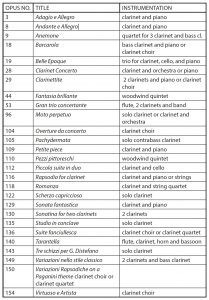
LS: In fact, conviviality, mutual esteem, and daily contact lead to the creation of groups made up entirely of members of the institution.
SS: Yes. And it is the institution itself that encourages them by using the chamber groups, at times, as an appendage of the band when conditions (especially space) require it. In addition to the ones already mentioned we have, for example, a Brass Ensemble and, as you can imagine, given the high number of musicians and instruments present, we can create ensembles of all types.
LS: In your 360° activity as a musician, are there moments as a performer, as a director, or as a composer that you love more than others?
SS: I don’t want to appear self-congratulatory, but certainly as a director having had the honor of conducting the Army Band a few times was something that filled me with pride. Equally satisfying was the recent experience with orchestra and soloists at the Apollo Theater in Lecce for the New Year’s Eve concert which featured the great tenor Salvatore Cordella. As a composer, after many years and hundreds of songs, I can say that the production dedicated in particular to my instrument and my activity is always the most loved. The latest additions—the “Anemone” Quartet for four clarinets and the Sonatina for two Clarinets in its first performance in 2022 and 2023—gave me a lot of satisfaction, and the “Anemone” Quartet received the compliments of the great American jazz clarinetist Eddie Daniels.
As a clarinetist, for several years First Lieutenant Colleague Vincenzo Isaia and I have been performing as soloists of the band Il Convegno by Amilcare Ponchielli, brought back into vogue for the first time years ago at the Festival dei Due Mondi in Spoleto. Our work with the classical wind quintet Millennium Ensemble in this period is also bringing excellent results.
LS: If I’m not mistaken, the Millennium Ensemble wind quintet is also the star of a recording that is important to you.
SS: You’re not wrong. The two volumes titled ESOP between Fable and Music are a recording project in which not only did I perform as a clarinetist and member of the wind quintet, but I also created the music and all the illustrations.
LS: Dear Salvatore, there is much more to tell but we will reserve it for the next occasion. With thanks to you and also to the authorities of the Army Band, and a warm greeting, I wish you a career of endless success.
SS: Thanks to you Luca and greetings to all our readers.
Salvatore Schembari can be reached at [email protected] or on Facebook.
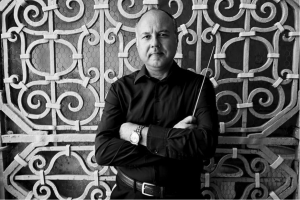
Salvatore Schembari
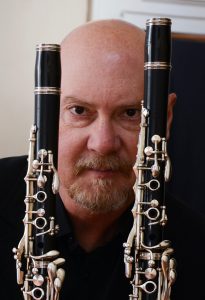 Luca Saracca is professor of clarinet and head of the communication office at the Conservatory of Music “Francesco Morlacchi” in Perugia, Italy. He served for five years as ICA chair of international relations (2018-2023) and as a founding member, together with Eddy Vanoosthuyse and Caroline Hartig, of the international council. He was born in Perugia where he studied clarinet at the conservatory under the guidance of Ciro Scarponi, and later studied at the Salzburg Mozarteum Akademie with Alfred Prinz (Vienna Philarmonic). He has performed on clarinet and basset horn throughout Europe and the US with many chamber music ensembles and orchestras including the Orchestra Filarmonica Marchigiana and Namaste Clarinet Quartet. Saracca plays Herbert Wurlitzer Reform Boehm clarinets.
Luca Saracca is professor of clarinet and head of the communication office at the Conservatory of Music “Francesco Morlacchi” in Perugia, Italy. He served for five years as ICA chair of international relations (2018-2023) and as a founding member, together with Eddy Vanoosthuyse and Caroline Hartig, of the international council. He was born in Perugia where he studied clarinet at the conservatory under the guidance of Ciro Scarponi, and later studied at the Salzburg Mozarteum Akademie with Alfred Prinz (Vienna Philarmonic). He has performed on clarinet and basset horn throughout Europe and the US with many chamber music ensembles and orchestras including the Orchestra Filarmonica Marchigiana and Namaste Clarinet Quartet. Saracca plays Herbert Wurlitzer Reform Boehm clarinets.
Comments are closed.